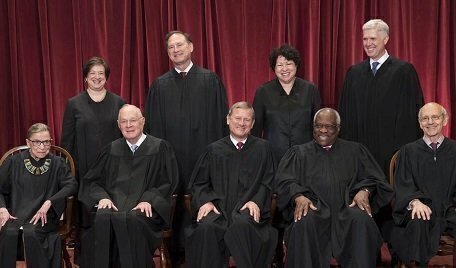The Supreme Court opened its new term on Monday by rejecting a long list of appeals filed over the summer.
 The appeals were considered a week ago at the Court’s annual “long conference.” The nine justices evaluate about 2,000 petitions and other motions annually at the meeting, and accept just a few for the term that starts on the first Monday in October. This year, nine cases from the conference last Monday were added to the docket on Thursday, including a significant case about public unions.
The appeals were considered a week ago at the Court’s annual “long conference.” The nine justices evaluate about 2,000 petitions and other motions annually at the meeting, and accept just a few for the term that starts on the first Monday in October. This year, nine cases from the conference last Monday were added to the docket on Thursday, including a significant case about public unions.
But yesterday, the attorneys for a vast list of appellants heard the bad news that the Justices will not grant their final days in court. It only takes four of the nine Justices to agree to accept a case for arguments, but that remains a major hurdle for most appeals to overcome.
Last week, we profiled three interesting cases that had the potential to be accepted by the Court. Only one of the three, Collins v. Virginia, was granted certiorari by the Justices. The Collins case involves the need for a search warrant to evaluate a motor vehicle stored on private property as criminal evidence.
The two other cases were denied by the Court in its Monday orders.
In Bolden v. Missouri, the Sixth Amendment was in question about the timing of competency hearings for defendants, and if a conviction can be overturned based on a lack of counsel at such hearings. Bolden was arrested on robbery and other charges, and decided to represent himself in the legal process. A Missouri appeals court ruled that Bolden actually needed an attorney at the pretrial competency hearing and ordered a new competency hearing for Bolden. But Bolden wanted his convictions overturned, based on precedents set in other cases, and a new trial held. Those requests are now denied.
In Davis v. United States, the case was about immunity granted to witnesses in a criminal trial. Two brothers were asked to testify as witnesses in an extortion case. One brother accepted a prosecution offer of immunity and testified against the defendant. Prosecutors denied an immunity application from other brother, who was expected to support the defendant, but would have potentially implicated himself on other grounds. The defendant lost on appeal and wanted the Supreme Court to settle a split among other federal courts on this issue.
Among the other denials in Monday’s orders were:
Final Exit Network, Inc. v. Minnesota, where the Florida-based company was fighting a conviction and fine for aiding in a 2007 assisted suicide. Final Exit had appealed a decision against the company based on First Amendment concerns.
Magee v. Coca-Cola Refreshments USA, where a blind man from Louisiana claimed that Coca-Cola had violated his rights under the Americans With Disabilities Act by not providing accessible vending machines.
Snyder v. Doe, where the Court denied an appeal from Michigan to allow it to extend new sex offender registry rules retroactively to registrants who had been convicted before the new laws were passed.






